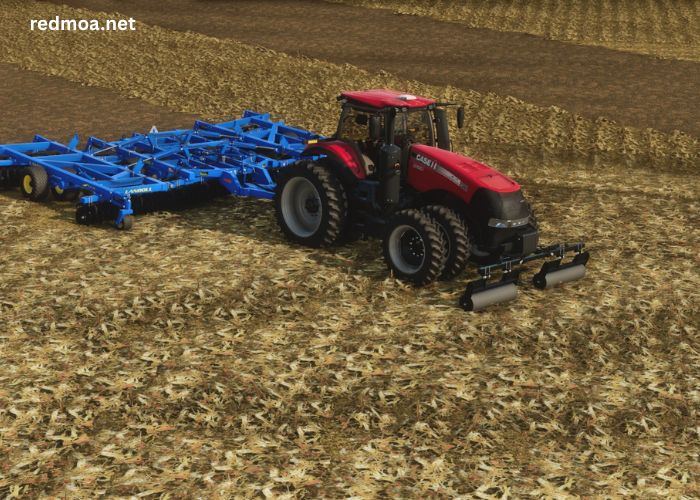If you’re in the farming or agriculture industry, you understand the importance of maintaining your equipment. One of the key components that take the brunt of the fieldwork are your tracks and tires, which can suffer damage from debris like stalks and rocks. The Lankota Stalk Rollers are an excellent solution for reducing wear and tear on your equipment while ensuring better performance in the field.
These rollers help in breaking down tough debris such as corn stalks, which, if left untreated, could cause serious damage to your tires and tracks.The Lankota Stalk Rollers are designed to protect your investment by preventing premature wear on your tires and tracks. With the ability to handle a wide range of conditions, these tools enhance the overall efficiency and durability of your farming equipment.
This blog will explore why the Lankota Stalk Rollers are an essential addition to your farming toolkit and how they contribute to longer-lasting equipment.
Key Points:
- Lankota Stalk Rollers protect your tracks and tires from damage.
- They break down tough debris like corn stalks to keep your equipment intact.
- Using stalk rollers improves the overall longevity of your machinery.
What Are Lankota Stalk Rollers and How Do They Work?
The Lankota Stalk Rollers are specialized attachments designed to be mounted on your equipment to help break down corn stalks and other debris in the field. These tools work by crushing the stalks into smaller pieces, which reduces the likelihood of them causing damage to your tracks and tires. The rollers are made with durable materials to ensure they can withstand tough conditions and continue performing effectively throughout the farming season.
These stalk rollers can be easily attached to your tractor or other farming equipment, and their design ensures that they don’t interfere with other parts of your machine. By crushing and breaking down the stalks, they help improve soil conditions and reduce the potential for tire punctures and track damage. Whether you’re working in a field with dense crop residue or one with minimal debris, the Lankota Stalk Rollers will make your work more efficient and safer for your equipment.
Here’s a comparison of how stalk rollers work in different field conditions:
| Field Condition | Stalk Roller Performance | Effect on Equipment |
| Dense Crop Residue | Breaks down large stalks into manageable pieces | Reduces track wear and prevents tire damage |
| Moderate Crop Residue | Smoothes and clears the field of stalks | Keeps tires and tracks clean, enhancing performance |
| Minimal Debris | Ensures that even small pieces of stalks are crushed to a manageable size | Minimizes the risk of punctures and damage to equipment |
As shown in the table, Lankota Stalk Rollers perform well in various field conditions, making them a versatile tool for any farmer looking to protect their machinery and improve their farming efficiency.
How Do Lankota Stalk Rollers Extend the Life of Your Tracks and Tires?
The primary function of the Lankota Stalk Rollers is to protect your tires and tracks from damage caused by debris in the field. Corn stalks and other tough materials can puncture or tear through the rubber of tires and tracks, leading to costly repairs or replacements. By using the Lankota Stalk Rollers, you reduce the likelihood of such damage, as these rollers crush the stalks into smaller, less harmful pieces.
The ability of the stalk rollers to break down tough debris is especially important in fields where the debris is abundant. Without these rollers, your equipment could suffer from excessive wear, leading to downtime and high maintenance costs. By investing in the Lankota Stalk Rollers, you are making a proactive move to extend the life of your machinery, reduce maintenance costs, and increase your overall productivity.
Additionally, the stalk rollers improve the overall performance of your equipment. With less debris to handle, your tires and tracks can work more efficiently, allowing you to cover more ground in less time. This leads to better fuel efficiency, faster operations, and ultimately, a more productive farming season.
What Are the Benefits of Using Lankota Stalk Rollers on Your Equipment?
There are many benefits to using Lankota Stalk Rollers in your farming operations. Here are just a few:
- Reduced Equipment Wear: By breaking down stalks and debris, the rollers prevent damage to your tires and tracks, which leads to a longer lifespan for your equipment.
- Improved Field Conditions: As the stalks are crushed, the rollers help to improve soil conditions by breaking down organic matter, leading to better soil health.
- Increased Productivity: With fewer obstacles in your field, your equipment can run more efficiently, saving you time and reducing the need for repairs.
Let’s compare these benefits in more detail:
| Benefit | How It Helps | Impact on Farming |
| Reduced Equipment Wear | Stalk rollers prevent punctures and other damage to tires and tracks | Increases equipment lifespan and reduces repair costs |
| Improved Field Conditions | Crushed stalks decompose into smaller pieces, enriching the soil | Helps create healthier soil for future crop cycles |
| Increased Productivity | Fewer obstacles and less downtime for equipment | Allows for faster field coverage and more efficient farming |
With these benefits in mind, it’s clear that Lankota Stalk Rollers are a worthwhile investment for any farmer looking to protect their equipment and enhance field performance.
Are Lankota Stalk Rollers Easy to Maintain?
Maintaining the Lankota Stalk Rollers is straightforward and requires minimal effort. These rollers are built with durability in mind, so they can withstand harsh field conditions without needing frequent repairs. However, regular maintenance ensures they continue to perform at their best.
Routine checks should be conducted to ensure that the stalk rollers are properly aligned and free from any debris buildup. Lubricating the rollers periodically will also help keep them functioning smoothly. Lankota provides guidelines and instructions on how to maintain their stalk rollers, so you can keep your equipment in optimal condition with little effort.
Here’s a maintenance checklist for Lankota Stalk Rollers:
| Maintenance Task | Frequency | Purpose |
| Check for Debris | After every field use | Prevents debris buildup and ensures smooth operation |
| Lubricate Moving Parts | Every 100 hours of use | Reduces friction and ensures long-lasting performance |
| Inspect for Wear and Tear | End of each season | Identifies any damage early and reduces repair costs |
By keeping up with these simple maintenance tasks, you can extend the lifespan of your Lankota Stalk Rollers and maximize their effectiveness.
Conclusion
The Lankota Stalk Rollers are an excellent investment for farmers who want to extend the life of their tracks and tires while improving the overall performance of their equipment. With their ability to break down tough debris and reduce wear, these rollers offer both protection and efficiency. Whether you’re dealing with dense crop residue or minimal debris, Lankota Stalk Rollers ensure that your equipment stays in top condition, reducing the need for costly repairs and downtime.
By investing in these rollers, you’re not just protecting your equipment – you’re enhancing your entire farming operation. With better field conditions, increased productivity, and a more efficient farming process, Lankota Stalk Rollers are a must-have for any serious farmer.
FAQ’s
- What are Lankota Stalk Rollers used for?
- They are used to break down tough debris like corn stalks, which can damage your tires and tracks.
- How do Lankota Stalk Rollers extend the life of equipment?
- By crushing debris into smaller pieces, they prevent damage to tires and tracks, reducing wear and tear.
- Are Lankota Stalk Rollers easy to install?
- Yes, they are designed to be easily attached to your farming equipment.
- Do Lankota Stalk Rollers require a lot of maintenance?
- No, they require minimal maintenance, including occasional lubrication and debris checks.
- Can Lankota Stalk Rollers improve field productivity?
- Yes, they help keep the field clear of debris, allowing equipment to operate more efficiently.





